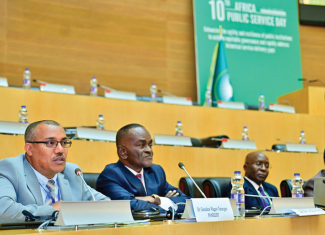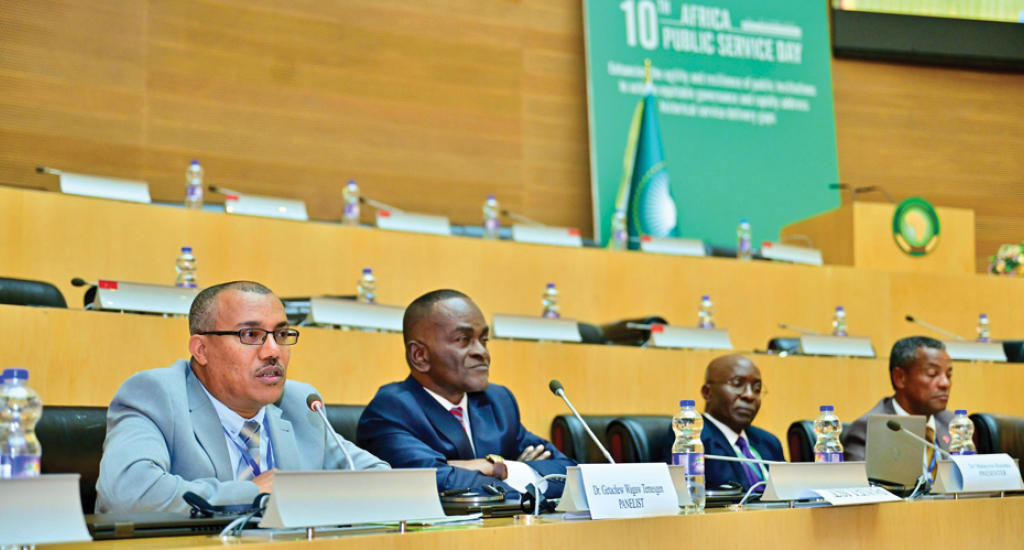APSD:
the quest for agile and resilient governance

The 10th Africa Public Service Day (APSD), held in June under the theme; “Enhancing the Agility and Resilience of Public Institutions to Achieve Equitable Governance and Rapidly Address Historical Service Delivery Gaps,” served as a pivotal platform for advancing Africa’s public sector transformation agenda.
The event, which was held at the African Union (AU) Headquarters in Addis Ababa, Ethiopia, brought together a diverse group of stakeholders, including Ministers, civil society representatives, academics and the private sector, to reaffirm their commitment to public service excellence and address stubborn service delivery challenges.
The Addis Ababa Declaration
The Addis Ababa Declaration, drafted on 23 June 2025, underscores the central role of the APSD in driving a new wave of reforms rooted in justice, inclusivity and accountability. The declaration calls for public institutions to actively redress the destructive legacies of colonialism and systemic inequities by transforming legal, digital and administrative foundations. This aligns with the AU’s 2025 theme, “Justice for Africans and People of African Descent through Reparations,” placing reparative justice at the core of institutional transformation.
The APSD discourse focused on several key thematic areas, each culminating in a clear set of commitments outlined in the declaration. Participants committed to reviewing and replacing outdated colonial-era public service laws with progressive, context-relevant legislation.
The declaration emphasises institutionalising merit-based recruitment, affirmative action and career progression systems to promote diversity, professionalism and equity within the Public Service. Furthermore, outcome statement calls for strengthening the autonomy and resources of crucial oversight institutions, such as anti-corruption commissions and audit authorities, to uphold integrity and accountability in governance.
Embracing digital technology
Participants at the event acknowledged the transformative potential of digital tools in fostering institutional agility, responsiveness and transparency, particularly in underserved areas. A key commitment is to expand investment in inclusive and affordable digital infrastructure to bridge the digital divide across gender, age and geography.
Member states were encouraged to develop multilingual, disability friendly and mobile responsive platforms to ensure equitable access to public services and information.
Way forward
A strong emphasis was placed on the indispensable role of civil society, academia, youth networks and the private sector in driving innovation and co-creation of public services. Member states committed to institutionalising inclusive dialogue platforms and collaborative governance mechanisms that incorporate diverse voices, especially those of vulnerable and underrepresented groups.
Delegates further called for the creation and protection of an enabling civic environment with legal safeguards for public participation and freedom of expression.
While the APSD declaration advocates for stronger oversight institutions and participatory governance, its high-minded aspirations stand in stark contrast to the persistent challenges impeding public service reform across Africa. There is a palpable risk that the declaration could amount to little more than well-intentioned political discourse, long on ideals but short on practical implementation. Without concrete action plans and robust accountability mechanisms, its commitments are unlikely to translate into tangible progress.
Whilst the APSD Declaration correctly emphasises peer learning and the exchange of best practices, its broader success hinges on addressing two critical dimensions: institutional reform and the integrity of public discourse. For these commitments to translate into tangible progress, member states must now confront the challenge of implementation, turning continental frameworks into localised action that delivers equitable governance and restores public trust.
The ASPD serves as a strategic platform to recognise and celebrate the dedication of public servants – many of whom operate in challenging environments with limited resources – while reflecting on the transformative evolution of Africa’s public administration. In honouring their contributions and resilience, the APSD underscores the critical role of public service in driving equitable governance, innovation and sustainable development across the continent.
Transformative public administration
Aligned with Agenda 2063’s vision of "The Africa we Want," the APSD underscores the imperative of transformative public administration to foster inclusive growth, social justice and sustainable development.
In the quest to promote accountability, digital innovation and multi-stakeholder collaboration, the APSD directly contributes to Sustainable Development Goal (SDG) 16 (Peace, Justice and Strong Institutions) and SDG 10 (Reduced Inequalities), advancing Africa’s aspirations for integrated, prosperous, and people-centred governance systems. This initiative reinforces the AU’s commitment to reparative justice and institutional excellence, in the result that public services remain adaptive to contemporary challenges and grounded in equitable service delivery for all citizens.
Africa’s key governance frameworks
The APSD ranks among the continent’s key governance frameworks, including the African Charter on Values and Principles of Public Administration and the All-Africa Public Sector Innovations Awards, all pioneered under South Africa’s leadership. The APSD’s pre-eminence led to its global recognition, with the United Nations formally adopting 23rd June as the UN Public Service Day, a testament to its global impact.




